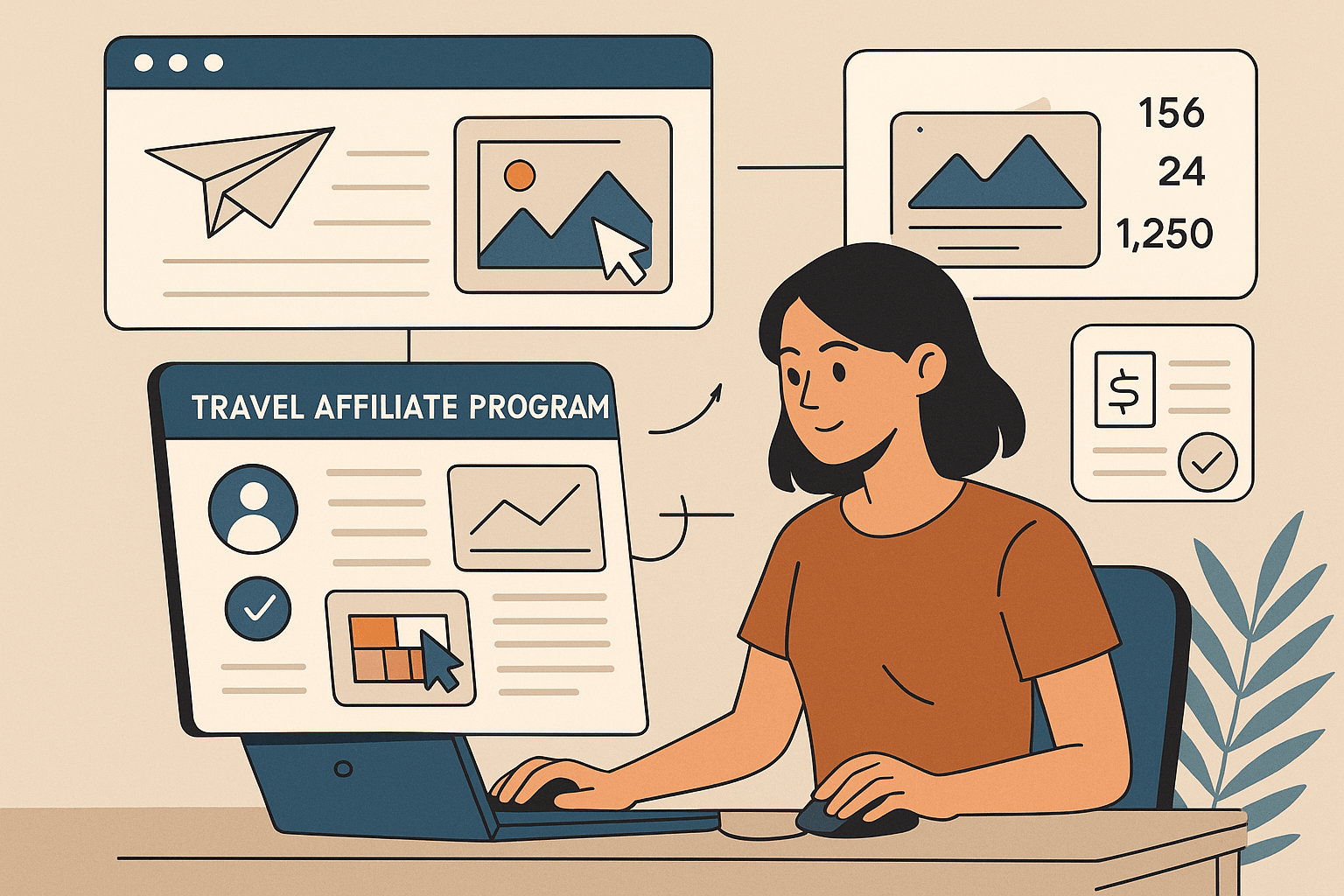
Travel
Travel Affiliate Programs : Turn Influencers into Revenue-Generating Partners
Introduction: The Power Shift in Travel Marketing

Digital platforms have brought a significant transformation to travel marketing practices. The travel industry has transitioned from its past reliance on print and broadcast advertising to adopt modern marketing techniques using technology and social media platforms and content creators. Travel brands have established partnerships with influencers which drives the fundamental changes in their methods for reaching and persuading travel
How the Digital World Transforms Travel Marketing
Travelers use social media platforms to broadcast genuine travel experiences to their audience at the moment they occur. The rising trend of tourists choosing personalized content and recommendations from peers compels brands to change their marketing methods.
- From Mass Marketing to Personal Stories: Traditional advertising methods which target large audiences through mass-market campaigns often fail to connect with viewers. Consumers now choose to follow authentic life stories from actual people especially from their social media networks.
- Micro-targeting and Niche Appeal: Through digital platforms businesses can precisely identify specific customer segments. Influencers connect brands with specific travel audiences who include those seeking adventure alongside those who prefer luxurious vacations.
- Continuous Engagement: Brands establish ongoing connections with travelers by regularly producing influencer content rather than using single static advertisements.
The travel industry uses social media platforms and content creators to transform their marketing strategies through influencer partnerships.
Influencers: From Promoters to Strategic Revenue Partners
Influencers exist beyond their traditional role of distributing promotional content. Their trusted voices together with their unique narratives and creative abilities establish them as crucial business partners for brands seeking genuine results.
- Revenue Diversification: Influencers enable brands to track their return on investment directly by driving bookings through swipe-ups and affiliate links along with promo codes.
- Content Co-Creation: Brands now involve influencers in every phase of campaign development as well as product creation and special travel experiences while viewing them as integral components of their marketing operations.
- Data-Driven Partnerships: Data from influencer marketing campaigns enables businesses to understand their target audience better along with market patterns and campaign results.
The new partnership framework indicates that brands and influencers work together to develop value. Travel marketers who view influencers as strategic partners instead of mere exposure channels will achieve better results when connecting with digital-savvy travelers while maintaining a competitive advantage.
Why Travel Brands Are Embracing Affiliate Programs

- Shifting Away from Traditional Advertising
Digital marketing evolution has driven travel brands to implement affiliate programs as their primary marketing approach. The dominant advertising method from the past now faces two major obstacles: rising costs and decreased transparency. Companies encounter increasing difficulties when attempting to determine how their advertising budget converts into valuable outcomes. Businesses now seek fresh marketing budget solutions which combine transparency with control since customer acquisition expenses continue to increase. - The Appeal of Measurable Performance
Affiliate marketing stands out because it provides clear metrics for success. Standard advertising methods often produce unclear results but affiliate programs operate on performance-based principles. The payment structure of brands depends on when customers complete designated actions including bookings or sign-ups. This results-driven payment framework links business interests directly to measurable business results which ensures all financial investments produce tangible outcomes. Teams have simple access to evaluate how many customers convert and the detailed path they follow and the precise financial gains from each partnership. - Harnessing Global Reach with Influencers
The need for broad international exposure has driven businesses to adopt affiliate marketing systems. Travel brands can access both specific and worldwide audiences through influencer marketing and content creators which eliminates their need for expensive broad-based promotional efforts. Travel businesses can leverage influencer partnerships to share their offerings through genuine personal experiences which builds trust between the brand and audiences. This method expands customer reach while creating trustworthy connections which develop stronger relationships with various market segments.
Key Drivers Behind the Shift
- The cost of advertising continues to rise at the same time businesses experience reduced understanding about their spending allocations.
- Affiliate programs provide businesses with clear results which are based on actual performance metrics.
- The process of measuring and optimizing ROI and conversions becomes easier through this approach.
- Strategic partnerships with influencers enable businesses to scale their global exposure to wider audiences.
- Travel brands obtain market testing freedom through their affiliate program to target various audience segments.
Travel brands utilize affiliate programs to establish sustainable growth methods which work effectively within dynamic marketing environments.
Key Challenges in Traditional Influencer Marketing

Traditional influencer marketing faces several persistent and evolving challenges that can significantly impact both efficiency and results.
The main obstacle in measuring revenue from influencer marketing campaigns stems from tracking direct sales which remain difficult. Influencer marketing operates differently from performance-driven digital marketing because its impact on brand perception and purchase intent extends over time thus making it difficult to measure sales and ROI from specific influencer initiatives. Followers typically encounter promoted products before they visit the website multiple weeks later to purchase which creates difficulties in tracking the customer journey to purchase analysis. Marketers encounter challenges in measuring influencer marketing effectiveness because the lack of universal measurement tools across platforms prevents them from justifying budgets and optimizing future campaigns.
Brand safety together with fake engagement and unclear ROI represent major issues in the influencer marketing arena:
- The prevalence of fake followers and inauthentic engagement on Instagram is significant because bots control approximately 9.5% of accounts and one-fourth of influencers maintain artificial followers. Brands receive misleading information about real influencer impact because fake reach statistics damage brand reputation when fake partnership relationships become exposed.
- Brand safety concerns emerge when brands risk partnering with influencers who demonstrate value discrepancies or past actions that conflict with brand principles resulting in potential public backlash.
- The evaluation of return on investment remains unclear because marketers struggle to determine the actual impact of their campaigns beyond basic reach numbers and superficial metrics while tracking direct correlation between influencer activities and sales remains a challenge.
The management of contracts and payments alongside compliance at scale creates additional obstacles for brands:
- The administrative responsibilities increase significantly when brands expand their influencer partnerships to include micro and nano-tier influencers. The process of handling contract negotiations along with payment processing and deliverable tracking and regulatory compliance becomes difficult to standardize since only 11% of influencers follow essential guidelines.
- Brands need to spend money on either dedicated influencer marketing tools or specialized agencies because these operational challenges continue to grow in complexity.
Key points:
- The measurement of direct sales alongside ROI evidence stands as the main obstacle that businesses face.
- Brand trust faces a significant threat because of fake engagement and insufficient transparency between brands and their customers.
- The increased size of operations creates major challenges for managing contracts along with the payment process.
- The essential process of regulating and maintaining value alignment between brands and influencers requires careful attention.
AI-powered analytics platforms demonstrate progress in solving specific marketing challenges through their fraud detection capabilities alongside influencer vetting and performance measurement functions but marketers need to continue their focus on these issues to achieve successful campaigns.
Benefits of Integrating Influencers into Affiliate Programs
-min.png)
Integrating influencers into affiliate programs unlocks powerful advantages for both influencers and brands, transforming how partnerships foster growth and value.
For influencers, joining affiliate programs delivers:
- Performance-based income: Influencers earn commissions on each sale, traffic, or action generated, giving them a direct stake in campaign results rather than just a flat fee.
- Long-term revenue streams: Affiliate partnerships enable recurring income, especially when influencers build loyal audiences who consistently engage with their recommendations.
- Monetization flexibility: Influencers can diversify their earning sources and choose brands that align with their authentic voice-leading to audience trust and sustained influence.
For brands, influencer affiliate integration offers:
- Expanded reach and trust: Nearly 90% of U.S. audiences engage with influencer-brand content, and 88% of consumers are inspired by influencer promotions-helping brands break into new markets and demographics.
- Authentic, high-performing content: Influencer- and user-generated content achieves 28% higher conversion rates than regular brand content, and can reduce customer acquisition costs by 20-30%.
- Quantifiable results: Affiliate models ensure brands only pay for actual outcomes-clicks, leads, or sales-making campaign ROI clear and budgets efficient.
- Higher sales growth: Brands combining influencers and affiliates see up to 46% higher affiliate-based sales than those relying on affiliate-only efforts.
This synergy facilitates long-term, mutually beneficial partnerships. Not only do 71% of influencers offer discounts for extended collaborations, but continuous partnerships also help brands develop a more consistent identity and foster consumer loyalty over time.
- Better feedback loops: 62% of frequent buyers are likely to share product feedback with influencers, enabling brands to gather customer insights and improve offerings.
- Optimized marketing spend: For every $1 spent, brands can see up to $12 in revenue-demonstrating unmatched cost-effectiveness.
In an evolving digital ecosystem, integrating influencers with affiliate programs blends authenticity, performance, and measurable impact-delivering results for both sides that traditional advertising struggles to match.
Essential Features of a Travel Affiliate Program for Influencers

A successful travel affiliate program for influencers must incorporate several essential features to ensure ease of use, effective promotion, and timely rewards for creators. These features help influencers maximize their revenue while maintaining a smooth partnership with travel brands.
Firstly, easy onboarding and an intuitive dashboard are crucial. Influencers often seek platforms that simplify the sign-up process and provide a clear, user-friendly interface to manage their campaigns. A well-designed dashboard enables creators to access their affiliate links, promotional materials, and statistics effortlessly, allowing them to focus more on content creation than on administrative tasks.
Real-time tracking of clicks, bookings, and commissions stands out as a vital feature. Travel affiliates want to monitor their performance continuously to understand which campaigns resonate best with their audience. Transparency and accuracy in tracking help influencers optimize their strategies and boost conversions. Leading programs like Impact Radius and Booking.com provide detailed analytics dashboards that update in real time, offering insights on sales and earnings.
Moreover, creative asset management and promotional tools are important. Affiliates benefit from easy access to high-quality banners, deep linking options, widgets, and customizable content to engage their followers effectively. The availability of such resources streamlines campaign launches and enhances marketing appeal without requiring influencers to create all assets independently.
Finally, a transparent payout process and comprehensive reporting are fundamental. Influencers need clarity on how and when they will be paid. Flexible payment options, clear commission terms, and detailed payout reports contribute to trust and long-term collaboration. Platforms with consistent and timely payments coupled with thorough reporting systems, like AvantLink and Impact, stand out for influencer satisfaction.
In summary, top travel affiliate programs for influencers feature:
- Simple onboarding and intuitive dashboards
- Real-time tracking of clicks, bookings, and commissions
- Access to creative assets and promotional tools
- Transparent and reliable payout procedures with detailed reports
These elements together create a robust ecosystem where travel influencers can thrive and generate income effectively.
Tech Stack and Investment Considerations
Building a robust tech stack for affiliate marketing and influencer partnerships in 2025 requires an integrated approach combining affiliate management platforms, tracking solutions, analytics, and seamless integration with core business systems.
- Affiliate Management Platforms and Tracking Tools
Efficient affiliate management platforms such as Reditus, Tapfiliate, and Scaleo provide end-to-end capabilities for program setup, partner recruitment, commission management, and performance tracking. These tools offer affiliate marketplaces, active partner recruitment features, fraud detection, real-time analytics, and multi-tier commission structures, helping businesses scale their affiliate programs transparently and efficiently. Tracking solutions embedded within these platforms ensure accurate referral tracking, conversion measurement, and commission payouts, minimizing errors and fraud. - Integration with Booking Engines, CMS, and Payment Systems
To maximize effectiveness, affiliate systems must integrate smoothly with existing booking engines (crucial in travel platforms), content management systems (CMS), and payment gateways. This integration enables real-time data synchronization for bookings, customer touchpoints, and financial transactions, allowing centralized management and consistent experience across channels. Platforms like Tapfiliate support multiple e-commerce and payment integrations, ensuring seamless workflows without siloed data. - Investment in Fraud Detection, Compliance, and Influencer CRM
As affiliate marketing grows, investment in fraud detection technologies becomes critical to safeguard ROI. Advanced platforms provide fraud prevention measures, monitoring suspicious activities and ensuring that only legitimate conversions are rewarded. Compliance, especially regarding data privacy and financial regulations, must also be prioritized in system design and operation.
Additionally, incorporating influencer Customer Relationship Management (CRM) systems helps businesses nurture influencer partnerships effectively. Such CRMs track influencer engagement, contract terms, content approvals, and payment schedules, fostering long-term collaboration and performance insights.
Key Considerations for an Effective Tech Stack and Investment Priorities
- Affiliate Management Platforms: Choose platforms with comprehensive partner recruitment, commission flexibility, and scalable campaign management (e.g., Reditus, Tapfiliate).
- Affiliate Tracking and Analytics: Ensure real-time, accurate tracking with customizable analytics dashboards to optimize ROI.
- Integration Capabilities: Seamless integration with booking engines, CMS, and payment gateways for synchronized data and smooth customer journeys.
- Fraud Detection Systems: Deploy advanced monitoring tools within affiliate platforms to prevent commission fraud and ensure program integrity.
- Compliance Management: Incorporate regulatory compliance features to meet data protection and financial laws.
- Influencer CRM Systems: Invest in dedicated tools to manage influencer relationships, contracts, and performance analytics.
By focusing on these areas, businesses can build a modern, efficient tech stack that drives growth while maintaining security and compliance in the evolving affiliate marketing landscape.
Building a Travel Affiliate Program: Step-by-Step Guide
Building a successful travel affiliate program requires a strategic and well-structured approach to maximize brand reach and sales. The process begins with identifying and segmenting the right influencers who align with your brand’s values and target audience. This typically involves selecting travel bloggers, social media influencers, and niche website owners whose followers match your customer profile.
Understanding their audience enables you to tailor your marketing approach for better engagement and conversion.
Once the ideal affiliates are identified, the next crucial step is to set up a robust tracking infrastructure and define attractive commission models. Implementing advanced tracking tools ensures transparency and accurate performance reporting, allowing affiliates to monitor their success effectively. Competitive and clear commission structures, with possibilities for tiered or performance-based incentives, keep affiliates motivated while maintaining your profit margins.
Developing effective marketing collateral and clear campaign briefs is equally important. Providing affiliates with high-quality banners, text links, and promotional content empowers them to represent your brand accurately and consistently across their channels. Additionally, well-crafted campaign briefs clarify expectations and messaging goals, ensuring that affiliates deliver content that resonates with potential customers.
After launching your program, the focus should shift to monitoring, optimization, and scaling. Regularly analyzing metrics like click-through rates and conversion rates helps identify opportunities to enhance the program’s effectiveness. Keep open communication lines with affiliates, offering support, feedback, and incentives to nurture long-term partnerships. As the program matures, scaling it by recruiting more affiliates and experimenting with commission models will help broaden your brand’s reach and revenue.
Key Steps to Build a Travel Affiliate Program
- Identify and segment influencers aligned with your target audience
- Establish tracking systems and define commission models
- Develop comprehensive marketing materials and campaign guidelines
- Launch the program with ongoing monitoring and affiliate support
- Optimize performance using data-driven insights
- Scale the program by expanding affiliate recruitment and enhancing incentives
This structured approach positions your travel affiliate program for sustained growth and mutually beneficial partnerships in a competitive travel market.
Case Studies: Influencer-Driven Affiliate Success Stories
The partnership between influencers and affiliate marketing proved essential for travel brands to boost their booking numbers through social voice trust and genuine content approaches. Multiple case studies demonstrate how influencers help brands reach bigger audiences and transform their interest into trackable sales.
Travelocity launched the "Gnational Gnomad" influencer program to team up with approximately 100 prominent travel influencers. Travelocity achieved massive brand exposure through influencer collaboration which resulted in a 1200% rise in impressions and ten times more brand mentions because of content co-creation with various traveler personas. The campaign achieved success because the brand maintained authentic connections with influencers who gained content control and felt respected leading to genuine stories which connected with target audiences.
Another successful strategy was executed by an attraction advertiser working with JEBCommerce. By analyzing back-end data and identifying untapped overseas markets, the team recruited over 1,200 global affiliates within 12 months. This targeted expansion drove a 70% increase in attraction booklet sales and continued revenue growth, showcasing how data-driven affiliate recruitment combined with influencer activation can unlock significant new markets.
In a slightly different approach, adventure and experience tourism brands like Pigeon Forge mobilized influencers to capture adrenaline-fueled, authentic moments. The campaign achieved over 346,000 total reach and 5.1% engagement rates more than double the industry average converting audience interaction into direct visits and bookings through compelling experiential storytelling.
Key strategies driving these successes include:
- Data-driven audience insights: Inform affiliate and influencer recruitment by analyzing customer demographics and behaviors to target high-potential markets.
- Authentic content creation: Empower influencers to share genuine experiences aligned with their personal style, increasing credibility and engagement.
- Ongoing relationship management: Maintain continual collaboration and recognition to keep influencers motivated and aligned with brand goals.
- Multi-format content supply: Provide raw and adaptable content for brands to maximize usage across social media, websites, and promotions.
- Clear conversion objectives: Integrate direct booking links or calls to action within content to link engagement to measurable sales growth.
By embracing these approaches, travel brands have transformed influencer affiliations into powerful affiliate marketing programs that not only amplify brand visibility but also drive significant, trackable bookings and revenue increases.
The Future of Travel Affiliate Programs
The future of travel affiliate programs in 2025 is shaped by significant shifts toward micro-influencers, niche travel communities, and cutting-edge technology integration, particularly AI and automation, to boost efficiency and precision.
Micro-influencers and Niche Travel Communities
The growth of micro-influencers—individuals with smaller but highly engaged audiences—and specialized travel communities is redefining travel affiliate marketing. Travelers today seek authentic, trusted recommendations tailored to their unique interests, such as eco-friendly adventures, luxury escapes, or digital nomad lifestyles. Affiliates focusing on these niches benefit from deeper audience connections, greater trust, and higher conversion rates due to the relevance and personal touch of their content.
Rise of Performance-Based Collaborations
In 2025, travel brands increasingly favor performance-based collaborations over fixed-fee sponsorships. This model aligns incentives by rewarding affiliates only when measurable results, such as bookings or sales, occur, optimizing marketing spend and driving ROI. Performance-based partnerships emphasize authentic engagement and allow travel marketers to precisely target tech-savvy consumers across multiple channels.
AI-Driven Automation and Advanced Attribution
Artificial intelligence is revolutionizing travel affiliate marketing by enabling automated program management, intelligent influencer discovery, and advanced attribution techniques. AI analyzes consumer behavior to personalize offers and optimize campaigns dynamically, ensuring promotions reach the right travelers at the right time. Automation streamlines tracking, reporting, and commission payouts, enhancing program efficiency.
Moreover, advanced attribution methods, including cross-device tracking and first-party data utilization, address privacy challenges such as the decline of third-party cookies. These technologies ensure accurate crediting of affiliate contributions across multiple devices and touchpoints, improving transparency and affiliate satisfaction.
Key Trends in Travel Affiliate Programs 2025:
- Expansion of micro-influencers and tightly knit niche travel communities driving authentic engagement.
- Shift towards performance-based partnerships that tie payouts directly to measurable results.
- Deployment of AI-powered automation for influencer discovery, campaign optimization, and reporting.
- Advanced cross-device attribution and utilization of first-party data to navigate privacy restrictions and improve tracking accuracy.
- Emphasis on mobile-first experiences and video commerce, aligning with evolving traveler behaviors.
Travel affiliate programs adopting these innovations will thrive by delivering personalized, trustworthy, and efficient travel experiences to consumers while maximizing their marketing impact in a competitive landscape.
- Schedule a time to talk: Book a Meeting
Conclusion
Travel affiliate programs have become powerful engines for transforming influencer partnerships into sustainable revenue streams. By collaborating with influencers who authentically promote travel brands, marketers can leverage trusted content and genuine recommendations that resonate deeply with audiences. These partnerships amplify reach while generating measurable returns, making affiliate programs a cornerstone of modern travel marketing strategies.
The travel affiliate landscape presents a unique opportunity to convert the vast interest in travel into actionable and trackable sales. Influencers drive valuable traffic by sharing personalized travel experiences, credible insights, and enticing offers that motivate their followers to book. This performance-based marketing model aligns incentives for brands and affiliates, ensuring that every dollar spent directly contributes to bookings and revenue growth.
Travel brands and marketers looking to launch or improve their affiliate programs should focus on building strong, transparent relationships with influencers. Providing them with competitive commission structures, reliable tracking technology, and ongoing support helps maximize engagement and long-term loyalty. Leveraging data-driven AI tools can further optimize campaign performance and personalize affiliate offers, enhancing conversion rates and revenue potential.
Key advantages of launching or enhancing travel affiliate programs include:
- Sustainable revenue generation through continuous influencer-driven referrals
- Expanded brand awareness by tapping into authentic influencer audiences
- Performance-based ROI ensuring marketing spend aligns with results
- Improved customer trust from credible content and recommendations
- Scalability as programs can grow with new affiliates and technology integration
Travel brands ready to capitalize on these benefits and build resilient revenue channels should explore developing or upgrading their affiliate programs now.
For tailored guidance and expert support in launching or enhancing your travel affiliate strategy, you can connect with specialists at One Click Travel Tech via Contact us. Empower your travel marketing with innovative affiliate partnerships that drive lasting growth and profitability.

Your Tech Partner for Scalable Travel Growth
We’re here to help you shape your business, so reach out to us today.